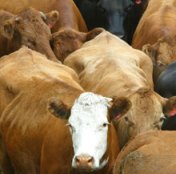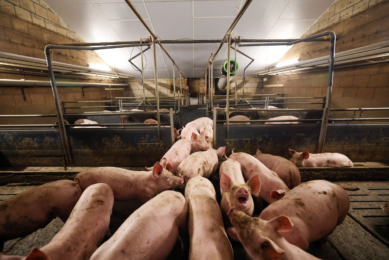Contaminated feed affects 10,000 cattle in Canada

According to the Canadian Food Inspection Agency, 10,000 cattle in Ontario and Quebec have consumed feed, used on 113 farms, containing traces of animal byproducts.
The feed was apparently contaminated when a rail car, which is used to ship
meat and bone meal for hog and poultry feed, was later used to transport blood
meal that was added to cattle feed.
meat and bone meal for hog and poultry feed, was later used to transport blood
meal that was added to cattle feed.
Rob Meijer, Agribrand Canada spokesman, said that the company had
voluntarily recalled the feed that was produced at the plants in eastern Ontario
and east of Montreal, adding that the company disposed of the feed at landfill
sites and replaced it with cattle feed that did not contain meat and bone
meal.
voluntarily recalled the feed that was produced at the plants in eastern Ontario
and east of Montreal, adding that the company disposed of the feed at landfill
sites and replaced it with cattle feed that did not contain meat and bone
meal.
“Out of respect for domestic and international sensitivity on this
issue, we wanted to make sure that there was no potential for human or animal
concerns. We produced the feed and we take 100% responsibility for this
issue.”
issue, we wanted to make sure that there was no potential for human or animal
concerns. We produced the feed and we take 100% responsibility for this
issue.”
Canada has a partial ban on adding animal byproducts to cattle feed. In
1997, the government banned the feeding of cattle remains back to cattle and
other ruminants, but it still allows cattle remains to be used in feed for
chickens, hogs and pets.
1997, the government banned the feeding of cattle remains back to cattle and
other ruminants, but it still allows cattle remains to be used in feed for
chickens, hogs and pets.
The production of cattle feed that includes meat, bones and other
byproducts violates government feed regulations and carries a maximum possible
penalty of a CAN$250,000 (US$219,000) fine and two years imprisonment.
byproducts violates government feed regulations and carries a maximum possible
penalty of a CAN$250,000 (US$219,000) fine and two years imprisonment.
There is concern and scientific evidence that cross-contamination of
animal feed streams can contribute to the spread of the infectious and
persistent prions that cause brain-wasting bovine spongiform encephalopathy
(BSE), commonly known as mad cow disease.
animal feed streams can contribute to the spread of the infectious and
persistent prions that cause brain-wasting bovine spongiform encephalopathy
(BSE), commonly known as mad cow disease.
According to James Atkinson, a animal nutritionist from the University
of Guelph, meat and bone meal is added to pig and poultry feed as a source of
calcium, phosphorus and protein.
of Guelph, meat and bone meal is added to pig and poultry feed as a source of
calcium, phosphorus and protein.
Related links:
- Canada Food Inspection Agency: Livestock Feeds
- FeedAssure: Managing
Feed Safety, Canada - Ontario Cattlemen’s Association











